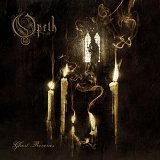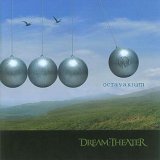OMS
Sunday, September 25th, 2005What I’ve been listening to over the last couple of days. Unlike the iPod generation with their song-based playlists, I’m a still luddite who listens to albums all the way through
After Crying - De Profundis
Prog-rock sung entirely in Hungarian. There’s as much violin and brass as guitar, resulting in something closer to orchestral chamber music that to rock’n'roll. Hauntingly beautiful in places, and quite unlike anything else in my record collection.
Ayreon - The Human Equation
Multi-instrumentalist Arjen Lucassen’s most recent rock opera concept album, featuring (as usual) a whole host of guest performers. This one has Ken Hensley of Uriah Heep fame, and vocals by Mostly Autumn’s Heather Findlay, Dream Theater’s James Labrie, and Opeth’s Mikael Åkerfeldt, among others. Like a lot of Ayreon’s work, it’s a bit patchy, but best bits shine.
Renaissance - Novella
I picked up this album because I’ve heard it said that Mostly Autumn sounded like them. I have no idea whether or not it’s one of their best or not, it was the only album of theirs I could find. I’m afraid I have never really been able to get into this one. I’d be interested to hear from Renaissance fans who might either confirm that Renaissance are not for me, or point me towards other more accessible albums of theirs.
King Crimson - The Power to Believe
KC’s most recent work, a good listen even if parts of it are a something of a retread of parts of Larks Tongues in Aspic and Starless and Bible Black given a modern production job.
Savatage - Dead Winter Dead
Savatage are another band into pomp-metal rock operas. The plot is about a love story during the Bosnian war. The music is pretty good power metal with classical flourishes, especially the multi-part counterpoint harmonies in the middle section of ‘One Child’, something I’ve never heard any other metal band attempt.
Rainbow - Long Live Rock and Roll
Third and (possibly) weakest of the three Rainbow albums with Ronnie Dio. By now Blackmore was moving in the more commercial direction that ultimately let to Dio’s replacement by pop singer Graham Bonnet. This album suffers from a couple of filler tracks, and too much lazy and lacklustre guitar playing. Still, the dark epic Gates of Babylon makes up for it. The medieval style “Rainbow Eyes” gives an early foretaste of what Blackmore would be doing a decade and a half later.







